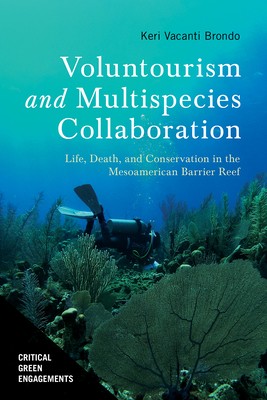
- We will send in 10–14 business days.
- Author: Keri Vacanti Brondo
- Publisher: University of Arizona Press
- ISBN-10: 0816542600
- ISBN-13: 9780816542604
- Format: 15.8 x 23.1 x 2 cm, kieti viršeliai
- Language: English
- SAVE -10% with code: EXTRA
Reviews
Description
Winner of the 2022 Edward M. Bruner Book Award
Voluntourism and Multispecies Collaboration is a lively ethnographic exploration of the world of conservation voluntourism and its engagement with marine and terrestrial biodiversity on the Honduran Bay Island of Utila, located in the ecologically critical Mesoamerican Barrier Reef.
In this highly readable text, anthropologist Keri Vacanti Brondo provides a pioneering theoretical framework that conceptualizes conservation voluntourism as a green industry. Brondo argues that the volunteer tourism industry is the product of coloniality and capitalism that works to produce and sustain an economy of affect while generating inequalities and dispossession. Employing a decolonizing methodology based on landscape assemblage theory, Brondo offers "thinking-like-a-mangrove" to attend to alternative worldings in Utila beyond the hegemonic tourist spectacle-dominated world attached to the volunteer tourism industry. Readers journey through the mangroves and waters alongside voluntourists, iguanas, whale sharks, turtles, lionfish, and islanders to build valuable research experience in environmental management while engaging in affective labor and multispecies relations of care. Conservation organizations benefit from the financial capital and labor associated with conservation tourism, an industry boosted by social media. This critical work asks us to consider the impacts of this new alternative tourism market, one that relies on the exchange of "affect" with other species. How are human socialities made through interactions with other species? What lives and dies in Utila's affect economy? Why are some species killable? Who gets to decide?EXTRA 10 % discount with code: EXTRA
The promotion ends in 21d.21:59:09
The discount code is valid when purchasing from 10 €. Discounts do not stack.
- Author: Keri Vacanti Brondo
- Publisher: University of Arizona Press
- ISBN-10: 0816542600
- ISBN-13: 9780816542604
- Format: 15.8 x 23.1 x 2 cm, kieti viršeliai
- Language: English English
Winner of the 2022 Edward M. Bruner Book Award
Voluntourism and Multispecies Collaboration is a lively ethnographic exploration of the world of conservation voluntourism and its engagement with marine and terrestrial biodiversity on the Honduran Bay Island of Utila, located in the ecologically critical Mesoamerican Barrier Reef.
In this highly readable text, anthropologist Keri Vacanti Brondo provides a pioneering theoretical framework that conceptualizes conservation voluntourism as a green industry. Brondo argues that the volunteer tourism industry is the product of coloniality and capitalism that works to produce and sustain an economy of affect while generating inequalities and dispossession. Employing a decolonizing methodology based on landscape assemblage theory, Brondo offers "thinking-like-a-mangrove" to attend to alternative worldings in Utila beyond the hegemonic tourist spectacle-dominated world attached to the volunteer tourism industry. Readers journey through the mangroves and waters alongside voluntourists, iguanas, whale sharks, turtles, lionfish, and islanders to build valuable research experience in environmental management while engaging in affective labor and multispecies relations of care. Conservation organizations benefit from the financial capital and labor associated with conservation tourism, an industry boosted by social media. This critical work asks us to consider the impacts of this new alternative tourism market, one that relies on the exchange of "affect" with other species. How are human socialities made through interactions with other species? What lives and dies in Utila's affect economy? Why are some species killable? Who gets to decide?

Reviews